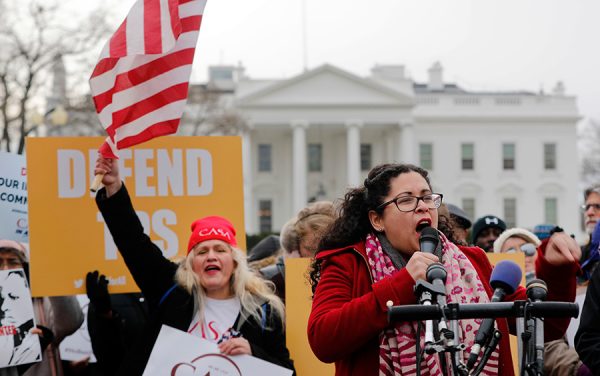
WASHINGTON – The US government has announced the end of a special protected status for about 200,000 Salvadoran immigrants, a move that threatens with deportation tens of thousands of well-established families with children born in the United States.
Homeland Security Secretary Kirstjen Nielsen announced the end of the “temporary protected status” granted to Salvadorans already in the US in 2001, when two major earthquakes rocked the Central American country.
They were given 18 months to leave or be deported, which officials said is enough time for a legislative solution to be crafted by Congress to allow them to stay.
“Only Congress can legislate a permanent solution addressing the lack of an enduring lawful immigration status of those currently protected by TPS,” said the Department of Homeland Security.
Part of a broader crackdown on illegal immigration by President Donald Trump, the move comes after 59,000 longtime resident Haitians and 5,300 Nicaraguans were stripped of similar protections late last year, after having been allowed to set deep roots inside the US for decades.
Democrats in Congress are also fighting to protect the right to stay inside the US of 690,000 young immigrants known as “Dreamers”, people who arrived in the country as children.
Trump has said he will back a compromise on the Dreamers if Congress budgets $18 billion to build an anti-immigrant wall along the border with Mexico.
Canada said it wanted to “make sure we’re ready” for an influx of Salvadorans, in an effort to prevent the kind of massive flooding of the border that took place after the US ended protections for Haitians.
Many, if not most, of those shielded by TPS had originally entered the country illegally or overstayed visas, but the program had effectively allowed them to settle down without the constant fear of deportation.
‘My life is here’
Previous governments rolled over the protected status with little debate, but Trump has pursued a tougher “law and order” approach to the issue.
For TPS beneficiaries, the decision was a thunderbolt.
“My life is here,” said Minda Hernandez, a 48-year-old housekeeper from Long Island who fled conflict in El Salvador 20 years ago – leaving a one-year-old child behind.
“This is where my home is, where I pay my taxes. I am happy here – even if I work myself to death.”
Now she fears most for her 16-year-old son, who was born in the US.
“There are so many gangs and crime back there,” she said. “But how could I leave him here alone?”
In San Salvador, President Salvador Sanchez Ceren avoided criticizing Washington and focused on the 18-month grace period.
Ceren’s administration “considers this decision to be a recognition of the contribution of our compatriots who hold this migratory benefit, who are an important workforce in that country,” the presidency said.
Ceren’s government has grown closer to the US, and was one of only eight countries at the United Nations to support the US move to recognize Jerusalem as Israel’s capital in December.


